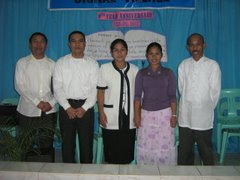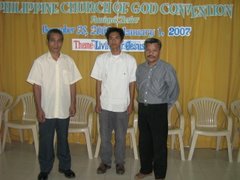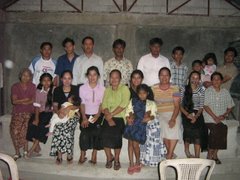Polity of the Church of God (1876)
Daniel S. Warner
The term ekklesia, from which we have church, is a generic term, and applies to any assembly, good or bad, temporal or permanent. In Acts 19 it is used with reference to two different assemblies, and neither religious. In verse 39 it refers to a lawful tribunal; in verse 32 and 41 it applied to a confused concourse.
We read of an ekklesia, or church, in the New Testament, which is qualified as being "of God;" hence among the various societies in the world there is one of which God is the author. Polity means form of government. Now, as law, order or government is essential to the existence of any organism, we ask what government has God enacted for his church? That the New Testament was given for that purpose and is all sufficient is only denied by ignorance or bigotry.
What, then, is the polity of the New Testament?
The Church of God was designed to fill all nations; but, unlike the Jewish worship, she is not required to convene in one place to offer her sacrifice of praise and obey the commands of her head and Savior. But that she could everywhere enjoy all the benefits and perform all the duties of the church organic, a full corps of officers was authorized in every city, town and community that formed a central point for worship. All in reach of any such point, who were recognized as disciples, constituted the Church of God in that locality. Nothing is said of the induction or admittance into those local churches. God admits into the body (Acts ii. 4) through the door of Christ (John x. 9; Eph. ii. 18), by the spirit (Rom. viii. 15; 1 Cor. xii. 13) on condition of faith (Rom. v. 1-2). By their fruits they were recognized as disciples, and consequently integral parts of the Church of God in that locality.
I shall first attend to the polity of those local churches. We find it was administered by elders or bishops and deacons. Of the latter I shall say nothing; of the former I notice that they are identical (Titus i. 5-7; Acts xx. 17; compare with ver. 28, where "overseers" is from episkopous, elsewhere translated bishops). Elder refers to the rank, bishop the duties. Paul says (1 Tim. v. 17), "Let the elders that rule well be counted worthy of double honor, especially they who labor in the word and doctrine." From this we learn that some elders labor in word and doctrine, others not. The former, I understand, are called of God to preach the word. From this and other Scriptures we also learn that elders have ruling authority; hence the New Testament polity is not congregational. And if I am to understand the term "Presbyterian" as submitting the entire and absolute control into the hands of the elders, I am unwilling to adopt it as expressive of the New Testament polity. That elders are vested with ruling authority is clear; but Peter says (1 Pet. v. 3), they should not be "as lords over God's heritage (margin 'overruling'), but being ensamples to the flock." If Paul exhorts (Heb. xiii. 17) to "obey them that have the rule over you." Peter also says (1 Pet. v. 5), "Yea, all of you be subject one to another and be clothed with humility."
Thus we see there is but little red-tape authority in the church. Elders are to rule by their holy example and love, watch over and feed the flock, preside over business meetings, appoint meetings of worship, lead the same, or invite some one to do so. "If a man be overtake in a fault," not only are the elders under obligations to look after him, but all "Ye which are spiritual restore such a one in the spirit of meekness." (Gal. vi. 1). This makes every brother the keeper of every other brother. Love and sympathy make this the duty of all. Besides, it is the duty of elders ex-officio.
In Matt. 18, the last step in trying to restore an offending brother is to "tell it to the church." He needs the sympathies and prayers, as well as the "meek admonitions of all that are spiritual" (Matt. xviii. 17-20; Heb. xii. 13; James v. 16). What human heart could withstand such an array of kindness, sympathy and love? Few, indeed, would not melt down and humbly confess their faults. But if he will not relent, "let him be unto thee as a heathen man and a publican." That is, he having put himself out of the church by becoming a sinner, and having been unsuccessful in restoring him, withdraw your fellowship from him. Thus we see officers and members counsel and work together in harmony to maintain the peace and advance the cause of Zion. Hence the New Testament polity, according to my mind, is not exactly Presbyterian, but simply Scriptorial; a government based on the "perfect law of liberty and all fulfilled in love."
I now pass to its general government of the church. I say "the church," because those co-ordinate churches constitute the one Church of God operating in different localities. They have some individual concerns, but in most respects they merge into one common brotherhood. They are called out of the world to serve the same Master. Their cause is one. They all have the same faith and are required to walk by the same rule: each one must subserve the general good. Now, how can these churches be kept uniform in faith and practice? How can each church and individual act so as to promote the general good, without the superintendence of some power over all? For these purpose popes, archbishops, general presiding bishops and presiding elders have been installed. But the New Testament has prescribed a different plan. Let us see how difference was adjusted and uniformity and harmony maintained.
In its complete moral conquest of the world, Christianity had to encounter three great antagonists--Judaism, Paganism and Orientalism. With Judaism it had to maintain a double conflict. Stephen and others had fallen in conflict with it as an external foe. But as an internal foe it was far more dangerous. It forbade Christ from demanding homage of, and proclaiming salvation to, the whole human race, as the author of the one true and universal religion. Forty years had passed and the light of the gospel was yet confined to the lost sheep of the house of Israel. The Apostles, it appears, had forgotten the extent of their commission, and Christianity was viewed as the completion of Judaism. But finally Samaria receives the word which was an innovation upon Jewish prejudice. And now Peter actually goes into the house of men uncircumcised, eats with the and preaches to them the gospel. What an insult to the Christian Jews. Peter must appear before the Eldership in Jerusalem and answer to charges. This he did, and after rehearsing the whole matter, an action was taken justifying Peter and glorifying God, forgiving salvation to the Gentiles. We have no record of any other business transacted at this first Eldership of the Church of God of Jerusalem, A. D. 41 (Acts 10 and 11).
Though Peter had taken the first step in the comprehensive view of Christianity, Paul was destined to become the great champion of this principle of universal liberty in Christ. Through his arduous labors Christianity soon spread to a wide extent in the Gentile world. This awakened much jealousy among the Jewish Christians. They saw that Christianity, instead of being the purest form of Judaism, was rapidly becoming an indiscriminating religion in which the Jewish element would soon be absorbed and lost. Paul was at once recognized as the author of this great revolution which threatened the extinction of all they had been taught to hold sacred. At Antioch the jealousy of the Jews seems to have kindled into a flame of indignation. Peter gave way to the strong tide of prejudice; and when Barnabas, Paul's colleague, "was carried away with their dissimulation" (Gal. ii. 11-14). This was a trying time for Paul. The Judahizing party was, doubtless, much emboldened by "certain men which came down from Judea" and taught that circumcision was necessary to salvation (Acts xv. 1). The great battle now came to a crisis, and after much disputation it was found necessary to appeal to the Apostles and elders at Jerusalem for a decision of the question. Paul, Barnabas and certain others were sent to lay the matter before the body. Seventeen years had elapsed since Paul had left Jerusalem with all the zeal of a Pharisee to destroy the Christians at Damascus. Since then he had twice, as a Christian, entered the holy city; but both visits were short and attended with danger (Gal. i. 18; Acts xi. 29-30). Now once more he comes to defend his principles and practices against an increasing torrent of opposition, which had interrupted his distant missionary labors, but the fountain head of which was among the Pharisees at Jerusalem. "The great question of liberty or bondage for all future ages was to be decided." A question that threatened the subversion of the whole plan of redemption. So eager were the Judahizing part for the conflict that immediately following the reception of Paul and Barnabas by the church at Jerusalem, some of the Pharisee Christians "rose up" and insisted that it was needful to circumcise the converts and command them to keep the Law of Moses. This was a direct attack upon the whole course of Paul's procedure among the Gentiles. "The Apostles and Elders, therefore, came together to consider of this matter" (Acts xv. 6). This was the second Eldership of the Church of God. There was some pretty warm discussing, I judge (ver. 7).
Peter is the first who is honored with a synopsis of his speech in the inspired journal. He takes a decided stand against Judaism; reminds them those converts in Syria and Cilicia under Paul and Barnabas were not the first Gentiles admitted into the kingdom, but that a good while ago he had been chosen to begin this work at the home of Cornelius, where God had given unmistakable evidence that he was no "respecter of persons." He pronounces the law an intolerable yoke, etc. He was followed by Barnabas and Paul. There was great silence in all the multitude while these zealous missionaries appealed to the miracles God had wrought by them as evidence that the gospel extended to all nations and every creature. Thus they proved the legality of their course by the same evidence that established the divine mission of Christ. But the voice of James the First, "and one of the pillars," who, with "austere features, the linen ephod and bare feet, the long locks and unshorn head of a Nazarite, resembling the ancient saints," would have much weight with the Judahizing party. And such, according to tradition, was the man who now came forward and deposed that the Jewish law was not of universal and perpetual obligation. After referring to the arguments of Peter, he adduced a passage from Amos as positive proof that under the light of the gospel the "residue of men," even the "Gentiles," should seek after and find God.
These four speeches having clearly established the fact that Judaism was to be superseded by Christianity, they were now ready for the question. James concludes with the following motion: "That we trouble not them from among the Gentiles have turned to God," etc. (Acts xv. 19-20.) This was [2] unanimously adopted and reduced to writing (verses 22, 23). And as THE CHURCH ADVOCATE was not yet published, a committee, consisting of Judas and Silas, was deputed to carry these decrees to Antioch; which, when they had delivered to the church, caused much consolation, and, doubtless, put an end to the whole controversy there.
Soon after this Paul and Silas set out together to visit all the churches and "see how they do." And as they went through the cities they delivered them the decrees for to keep. that they were ordained of the "Apostles and elders at Jerusalem." So were the churches established in the faith, i.e.--to one uniform faith (Acts xvi. 4-5).
The second item of business I shall notice was this: At this meeting it was agreed that Paul and Barnabas should labor among the Gentiles, and James, Peter and John among the Jews (Gal. 2. 9). This precedent teaches that ministers should be assigned to the various fields by the assembled Eldership, and not by a presiding elder, neither as the churches independently may "hire" them.
Item second: The reports of Paul and Barnabas to that body furnish an example for ministers' reports as part of the business of an Eldership.
Item third: We are told at this meeting there was provision made to relieve any part of the church that was in want (Gal. 2. 10).
Observation fourth: We notice that they depended upon the spirit to dictate all their business (Acts 15. 28). Were this now carried out there would be much less business transacted for the gratification of prejudice and jealousy.
Fifth: We learn from James' speech the true business of an Eldership is not to legislate, but to appeal to the word of God as the standard by which to settle all controversy.
Sixth: It appears (Acts 15. 22) that the whole church convened with the Apostles and elders, and enjoyed the privilege of expressing themselves. Hence it is proper to extend to all the brethren the courtesy of an advisory seat.
Seventh: The business, however, seems to have been transacted by the Apostles and elders (Acts 15. 6; 16. 4). But the Apostles have ceased, hence it devolves upon the Eldership. Hence the propriety of the name Eldership meeting for those convocations. Thus we find a precedent for the name and nearly all the business of our present Elderships in those first two held with the Church of God in Jerusalem. There are no directions as to how frequently the Eldership should convene; hence, it is left to circumstances and the judgment of the body; as is also the propriety of dividing into districts Elderships for convenience, and then holding a less frequent general Eldership meeting to consult upon general interests and maintain universal harmony.
D. S. WARNER.
Seward, Neb., Dec. 15, 1874.




















































































































